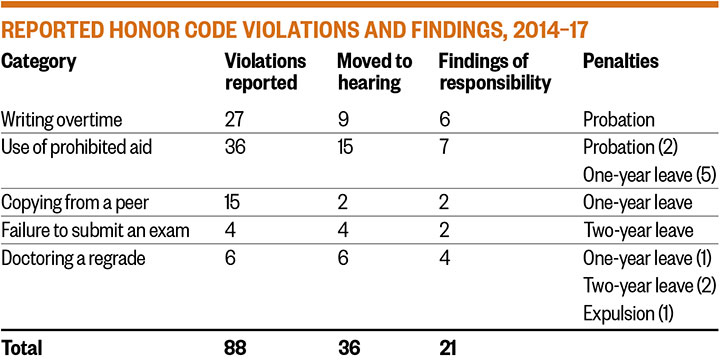Honor System Revamp?
Report suggests major revisions in how academic violations are handled
A student-faculty group created to examine the 125-year-old honor system has suggested wide-ranging changes, including the addition of faculty to the Honor Committee and creating new options for penalties.
The Honor System Review Committee was formed last January after three referenda proposing changes to the Honor Constitution were approved by the undergraduate student body but put on hold by administrators, who said they would “fundamentally alter the University’s disciplinary penalties and standards for assessing violations of the Honor Code.” A fourth referendum, which dealt with a procedural issue, was implemented.

Many of the review committee’s recommendations, released last month, center around reaffirming the honor system as a pact between students and faculty, increasing faculty involvement in the honor system, and re-evaluating penalties for honor-system violations. They include consideration of these proposals:
- Adding faculty to the Honor Committee. “Faculty engagement is both important and consistent with the original philosophy of the honor system,” the group said.
- Ensuring that penalties are appropriate. For example, consider a one-semester suspension instead of a one-year suspension for first-time offenders, shorter probationary periods, and a “reprimand” option for overtime violations (in which students continue working on an exam after time has been called).
- Setting standardized language for calling time in exams (such as “pencils down”) and ensuring that instructors restate exam policies before the test.
- Improving understanding of the honor system and its processes.
- Appointing professional investigators to pair with student investigators to reduce students’ workloads.
The group also said the University should consider transferring all academic-integrity violations to a single student-faculty committee. Currently the Honor Committee is responsible for matters relating to in-class exams; the Faculty-Student Committee on Discipline handles violations relating to take-home exams and coursework, as well as serious non-academic violations of University policy.
Honor Committee chair Liz Haile ’19, a member of the review committee, said “students think there is room for improvement and change in a lot of ways” to honor-system policies and procedures. The review committee heard from both faculty and students that some students are not reporting peers for violations because some of the penalties are considered to be too harsh, she said.
The Honor Committee is working to rebuild student trust in the system, Haile said, adding that the review committee’s recommendations and efforts by the Honor Committee “to be fair, transparent, and empathetic” are major steps toward restoring that trust.
Haile said the most common Honor Code violations include overtime offenses and the use of unauthorized resources, such as calculators or smartphones. Last year, the Honor Committee expanded its membership from 12 to 15 to keep up with the workload resulting from technology-related investigations, she said.
“Cases have become more complicated by the introduction of technology in the classroom,” Haile said. “It’s tough when we’re having to look at WiFi records, which require a lot more time and energy related to investigating.”
A separate study group that was created to look at the Faculty-Student Committee on Discipline produced its own recommendations, including the addition of a “reprimand” as an informal penalty and exploring a one-semester suspension option.
The University said a third committee will examine the reports of both groups and make recommendations to Dean of the College Jill Dolan, Dean of the Faculty Sanjeev Kulkarni, and Vice President for Campus Life Rochelle Calhoun, who will decide what steps will follow.












7 Responses
Robert Hills ’67
7 Years AgoRevisiting the Honor Code
The Honor Code explanatory booklet was to me the first imprimatur of what was special about Princeton. “I’m admitted.” “I’m trusted.” “I must be responsible.”
Nevertheless, the snitching on others always provoked the most controversy when I then described the Honor Code to non-Princetonians. Like good law professors, several posed hypotheticals honing in on the penalty phase of one remedy for all. My response was always defensive, deterrent-based, and frankly inadequate.
Fifty-plus years later, legal training and life have taught me that in a “just society,” all penalties are draconian if their application is not nuanced. Thus, I applaud this initiative (On the Campus, Nov. 7) to implement the thinking of John Rawls ’43 *50, among many others.
However, the addition of faculty to the committee seems inconsistent with the Code’s underlying premise of student maturity/student self-responsibility. I suggest that if a faculty member were to be involved, it should be as an observer and or at most as a nonvoting facilitator/moderator. And consideration should be given to rules that the faculty member should not have any direct teaching relationship with any of the student members and must recuse herself or himself if there is any teaching relationship to the student subject to discipline.
Robert L. Poster ’62
7 Years AgoRevisiting the Honor Code
I find it regrettable in the report that copying from a peer resulted in a one-year suspension. It would have meant not just expulsion in my day, but the record of the violator being expunged. Based on the reported results of incidences, the Honor Code appears to have been watered down, and I find that disappointing.
Murphy Sewall ’64
7 Years AgoIt's About Honor
I agree with Robert Poster ‘62. The honor system is about honor, not law. I regard it as a degree requirement. It’s a certification that academic work is one’s own that is not generally available elsewhere.
Thomas H. Wright ’62
7 Years AgoRevisiting the Honor Code
When I retired in 2003, after 31 years as Princeton’s first in-house lawyer and then as vice president and secretary of the University, one of the principal matters of unfinished business I left behind — with substantial regrets, worries, and misgivings — was adjustment and “restatement” of the Honor Code, which is clearly a core element of Princeton.
During my tenure we had (in our own minds at least) barely withstood a lawsuit (including a trial lasting more than two months) on behalf of a student who challenged basic elements of the Code — which were of course devised in an entirely different era. Other challenges, within the University itself and legal, seemed inevitable.
The problems that needed to be addressed, as I saw them, were both deeply conceptual (most importantly the inevitable confusion and conflation in today’s hyper-litigious America between the Honor Code — decidedly non-legal in its goals, purposes, and procedures — and civil or criminal court trials); and also matters of technical adjustment (for example, “papers” greatly overtaking “exams,” and the enormous impacts of technology on research and instruction).
While I do not know the specifics of the proposals now being considered on campus as the result of student, faculty, and administrative deliberations and recommendations, I am strongly encouraged that these important issues are being addressed in this way. Reform is an essential part of conserving the most important values.
Martin Schell ’74
7 Years AgoIs Cheating On the Rise?
The stats suggest a serious rise in cheating, at least compared to what I remember from decades ago. The article could have been improved by listing similar offenses from 10 or 20 years ago for comparison. If in fact cheating is on the rise, or at least reported cases are on the rise, it's hard to understand why "reluctance to report someone" is currently considered a significant issue.
Although a reprimand sounds less serious than probation, it's unclear what the difference would be in terms of a student's uninterrupted participation in coursework. Also, I don't see any discussion of penalties *increasing* for repeat offenders, which is something that needs to be accounted for.
Robert Hills ’67
7 Years AgoSelf-Responsibility, Nuance Go Together
The Honor Code explanatory booklet was to me the first imprimatur of what was special about Princeton. "I'm admitted." "I'm trusted." "I must be responsible."
Nevertheless, the snitching on others always provoked the most controversy when I then described the Honor Code to non-Princetonians. Like good law professors, several posed hypo's honing in on the penalty phase of one remedy for all. My response was always defensive, deterrent-based and, frankly, inadequate.
Fifty-plus years later, legal training and life have taught me that in a "Just Society," all penalties are draconian if their application is not nuanced. Thus, I applaud this initiative to implement the thinking of John Rawls among many others.
However, the addition of faculty to the committee seems inconsistent with the Code's underlying premise of student maturity/student self-responsibility. I suggest that if a faculty member were to be involved, it should be as an observer and or at most as a non-voting facilitator/moderator. And consideration should be given to rules that the faculty member should not have any direct teaching relationship with any of the student members and must recuse herself or himself if there is any teaching relationship to the student subject to discipline.
Norman Ravitch *62
7 Years AgoWhat Other Sins Should We Outlaw?
No one has ever in all of human history discovered a way to prevent crime and sin. Why are we still trying?